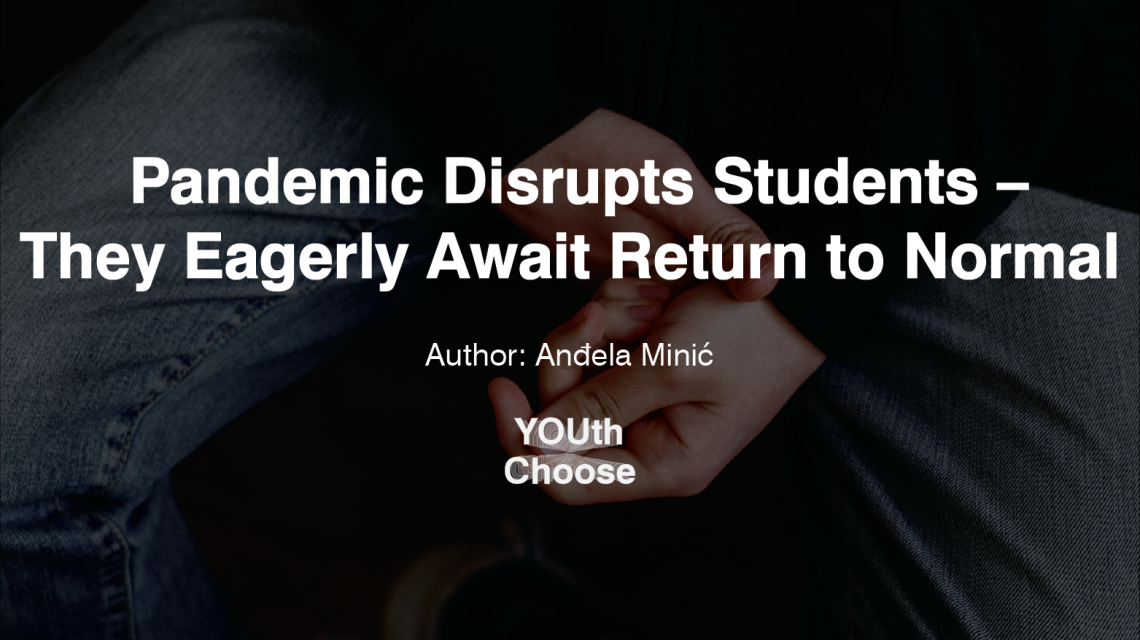Insecurity, anxiety, constant race against time and deadlines, stress – these are the words with which 46.8 percent of the surveyed students described studying during the coronavirus pandemic. A survey sent to 100 students shed light on their view of the problems caused by the pandemic. An unexpected pandemic that disrupted the plans, lifestyle and work of many affected students as well. Psychologist Ms Milena Račeta Stojanović explains that this phenomenon is not surprising.
“Mental health is very sensitive to insecurity, uncertainty, unpredictability. These are the characteristics of the pandemic that we have been facing since March, and there is an increase in mental difficulties in all categories, and especially among young people,” she explains.
She added that even before the pandemic, the percentages of anxiety and depressive difficulties among young people worldwide were high, and these numbers will certainly increase due to the circumstances in which we live.
“My experience is that high school seniors and college freshmans are actually hardest hit by the effects of the pandemic, as a large number of them have had to change plans regarding schooling, exchange planning, travel, study in other cities or countries, where they have the experience that something was denied to them without their fault, and that they have to bear the consequences”, explains the psychologist.
The first closure of schools and colleges in Montenegro followed on March 16, 2020 after the registration of the first case of coronavirus, and involved a complete lockdown. Seven months later, with the beginning of the new school year, classes were organized in such a way that students from the first to the sixth grade of primary school and first grade of high school returned to the classrooms, while the others followed the classes online.
Over 90 percent of the surveyed students are eagerly waiting to return to the faculties, and psychologist Ms Račeta Stojanović explains that by the nature of humans, who is first and foremost a social being. “Online interaction is not completely unsocial, but now, more than ever in history, we are becoming aware of how important physical presence is to feel emotionally connected. In our society, this is especially important, considering that intimacy is expressed by physical intimacy, touches, kisses … even with acquaintances. All the more so, physical distance or complete physical exclusion is even more painful and difficult for our young people to endure than in some other cultures”, she states.
Considering that Montenegro currently has 909 infected people* per 100,000 inhabitants, according to WHO data, it is not surprising that students take the reduction of coronavirus spread as the biggest advantage of online teaching. Other advantages they mentioned concern the fact that they can follow classes from anywhere they are at a given moment, and that they do not waste time and money on transportation to the faculty, but complete their obligations faster. The materials from the lecture were recorded, so it is a good thing that they can easily return to some part if they did not understand it. It is clear that online learning greatly complicates the acquisition of materials, but also mental development and stability. Online communication is significantly more difficult to track non-verbal and finer verbal cues, which increases misunderstanding but also refusal to participate because it requires much more extra energy. Students agree that the biggest drawback of online learning is the loss of interaction with the professor and colleagues, and the loss of concentration and focus, especially when it comes to longer lectures. The inability to see the reactions to what was said, if there is an ongoing discussion, is a big flaw, according to the respondents. In third place are technical problems, not every student has a laptop and a permanent internet connection to be able to follow classes.
As students of civil engineering and architecture explained, it is impossible to understand from most practical subjects what is expected of them in some situations. “Since our faculty, Architecture, is reduced to a line and a drawing, it is difficult to convey what was meant by that particular work, it is difficult to work online with assistants at work because the help they provide is not kept on paper …” states Anja Vučeljić, a student of specialistic studies at the Faculty of Architecture. Students think that it would be useful to work on improving relations with professors and assistants, because, as they claim, sometimes there is a lack of interaction and misunderstanding because a certain thing is not communicated well, but they claim that professors have understanding for the current situation and difficulties students face.
Online teaching has presented many young people with great challenges in organizing their own time, relying on internal motivation when learning, and controlling their free time, which they did not have until then. Ms Milena Račeta Stojanović, who predominantly works with young people, testifies that these challenges are huge and require great maturity.
“A large number of young people have become disillusioned with themselves, withdrawn from commitments, or postponed commitments longer than ever before”, she adds.
It is interesting that, despite everything, most students do not think that this way of organizing learning has not affected the quality of teaching in the direction of its reduction. However, they agree that learning online requires more effort and effort to understand the subject, especially for students of technical faculties or students who have practical subjects.
“The quality of teaching at my faculty is at the same level as in previous years, all the material covered by the plan is skipped, and the exam questions are of the same difficulty as in previous years,” wrote Nikolina Tomović, a student of the Faculty of Law. The psychologist explains that going back to school will open new questions after we face – how many knowledge gaps came with the pandemic, and what are the consequences of these omissions.
“It is known in psychology that every crisis is also a chance, and it will be a chance for our society to devise ways to make up for lost time, introduce practical innovations, strengthen those skills that were neglected during the pandemic. It will be very important to plan special support for the mental health of children, youth and teachers after returning to regular schooling, because many will benefit from an adequate and sensible approach to mental health, bearing in mind that many consequences will not disappear by themselves,” she concluded.
*The article was prepared on December 27, 2020, and the information stated here reflects the WHO data from that period.
Author: Anđela Minić
This story was produced during the three-month Program for Students of Journalism in the Western Balkans within the framework of the advocacy project “A Better Region Starts with Youth” implemented by RYCO with the support of the Federal Republic of Germany. All journalists’ work is their own and the content of any given article does not represent the opinion of RYCO, and RYCO cannot guarantee the validity and the accuracy of the information that these stories contain.



